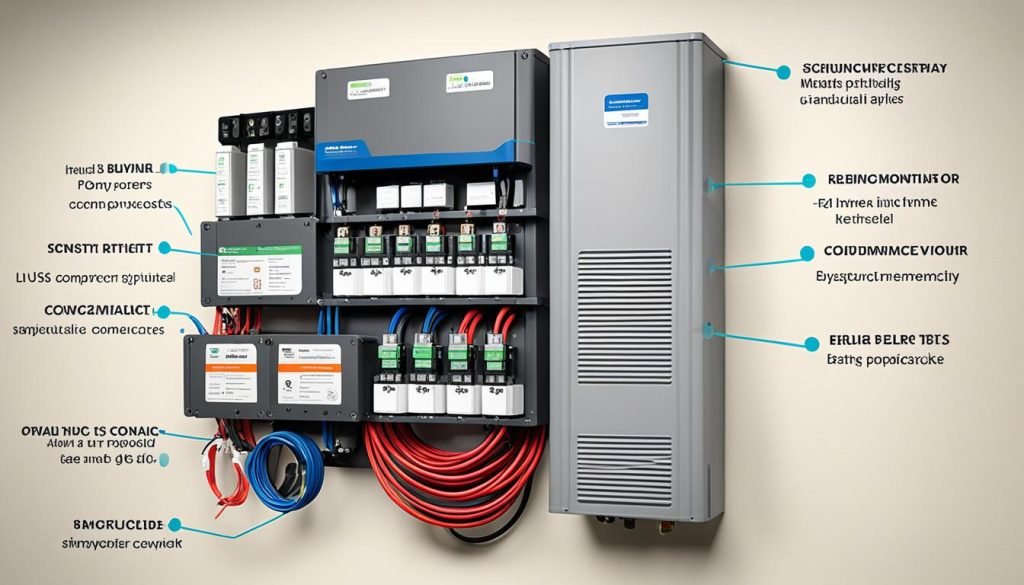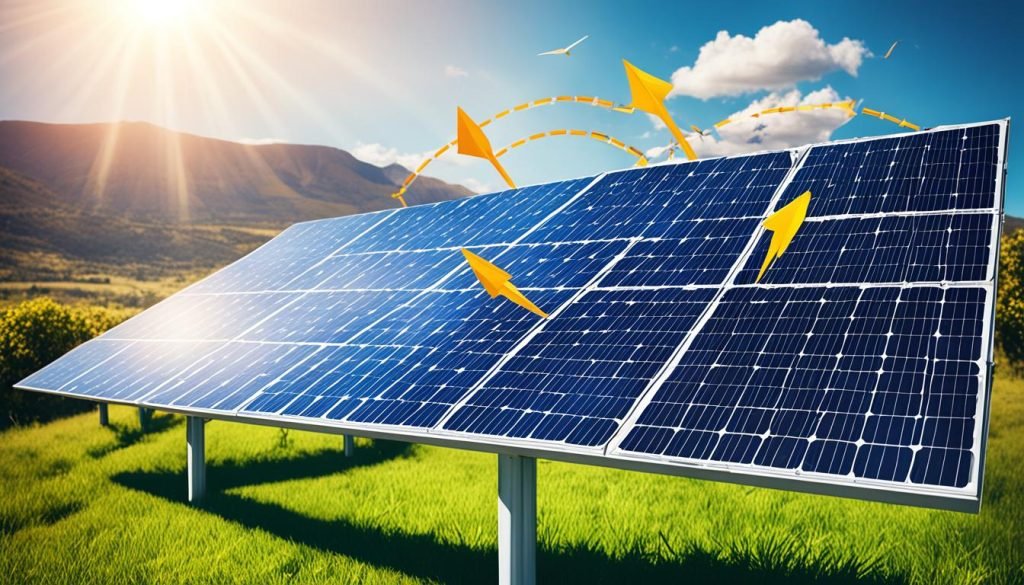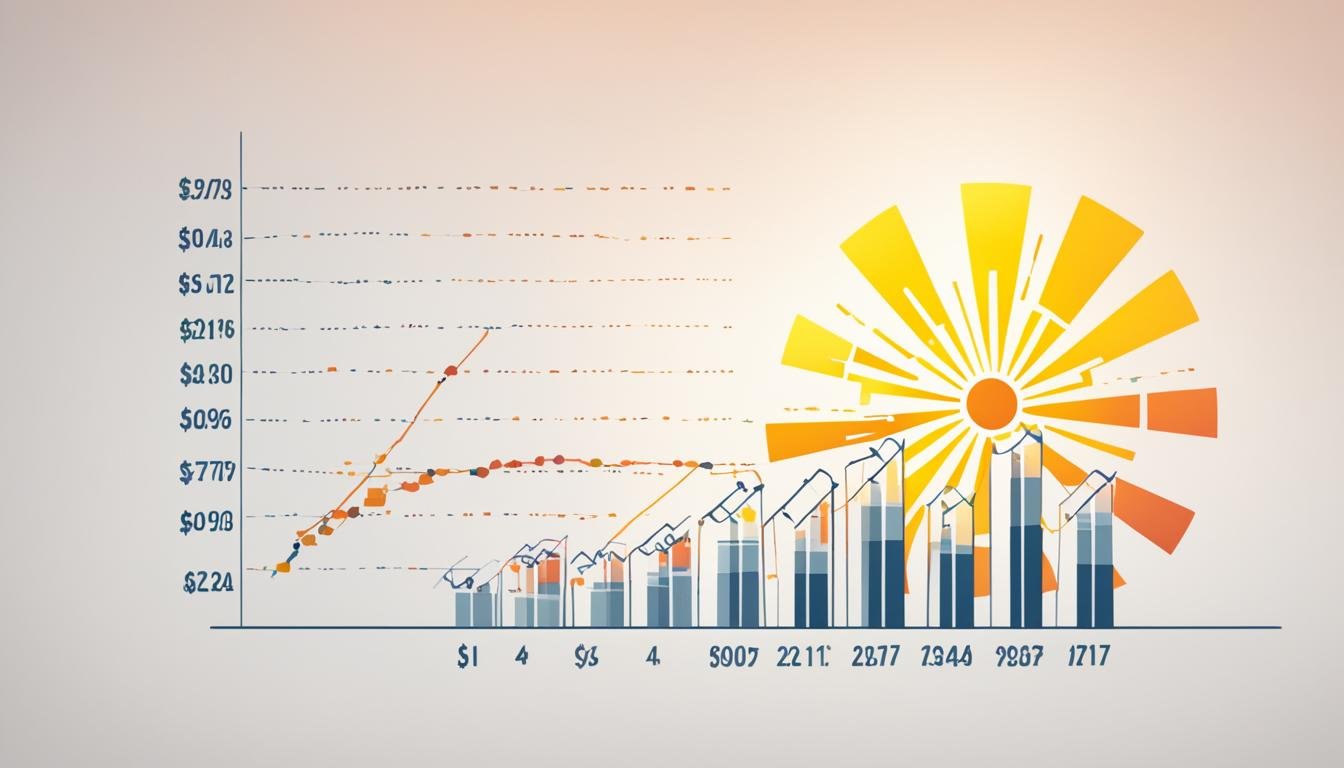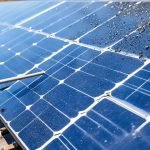Are you curious about the cost of eco-friendly and cost-effective power solutions in South Africa? Look no further! In this comprehensive guide, we will delve into the landscape of solar panel prices, exploring the affordability of solar PV systems for homes of all sizes and the options available for backup power systems. Get ready to discover the best ways to harness the power of the sun in South Africa.
Key Takeaways
- Learn about the current landscape of solar panel prices in South Africa
- Explore the costs of solar PV systems for small to large homes
- Discover the affordability of backup power systems
- Understand the factors influencing solar panel prices, including brand, durability, and warranty considerations
- Gain insights into the economics of installing solar panels and the potential return on investment
The Current Landscape of Solar Panel Prices
In this section, we will discuss the current landscape of solar panel prices in South Africa. Understanding the cost of solar panels is crucial for anyone considering a switch to sustainable and cost-effective power. By exploring the current market trends, we can gain insights into the affordability and potential savings offered by solar energy.
To give readers a comprehensive understanding of the costs involved, we will focus on two key aspects: solar PV system costs for small to large homes and the affordability of backup power systems.
Solar PV System Costs for Small to Large Homes
The cost of a solar PV system can vary depending on various factors such as system size, installation complexity, and quality of components. For small homes, where energy consumption is generally lower, the initial investment for a solar PV system may be relatively lower as well. On the other hand, larger homes with higher energy demands may require a larger system, resulting in higher upfront costs.
When considering the cost of solar PV systems, it is important to look beyond the initial investment. The long-term benefits and potential savings from reduced electricity bills should also be factored in. A well-designed and efficiently installed solar PV system can provide significant returns on investment over its lifespan.
Backup Power System Affordability
In addition to grid-tied solar PV systems, backup power systems are becoming increasingly popular in South Africa. These systems provide a reliable source of power during outages or load shedding. Backup power systems can be seamlessly integrated with solar PV installations, ensuring uninterrupted power supply even in challenging situations.
The affordability of backup power systems depends on several factors, including the capacity of the system, battery technology, and inverter capabilities. While backup power systems may involve additional upfront costs, they offer peace of mind and independence from the grid. As battery technology advances, the affordability and efficiency of these systems continue to improve, making them an attractive option for homeowners.
In the next section, we will delve into solar panel prices by brand to provide readers with a comprehensive understanding of the pricing landscape in South Africa.
Solar Panel Prices by Brand
In order to make an informed decision when purchasing solar panels, it is important to consider the prices offered by different brands in South Africa. Not only does the brand affect the cost, but it also plays a significant role in the durability and warranty of the panels.
Durability and Warranty Considerations
When investing in solar panels, it is crucial to choose a brand that offers high durability. Durability ensures that the panels can withstand various weather conditions, including hail, high winds, and extreme temperatures. This ensures that your investment will last for many years to come. Additionally, consider the warranty offered by the brand. A robust warranty provides peace of mind and protects you against any potential panel malfunctions or damage.
Comparative Costs of Popular Brands in South Africa
To help you compare the costs of popular solar panel brands in South Africa, we have compiled a table below:
| Brand | Average Cost per Panel (ZAR) |
|---|---|
| Brand A | 4,500 |
| Brand B | 5,000 |
| Brand C | 5,500 |
| Brand D | 5,200 |
| Brand E | 4,800 |
Please note that these prices are approximate and may vary depending on the specific model and capacity of the solar panels. It is recommended to consult with authorized dealers or request personalized quotes directly from the brands for accurate, up-to-date pricing information.
When comparing costs, it is essential to consider the durability and warranty offered by each brand to ensure you are getting the best value for your investment. Additionally, research the customer reviews and ratings of each brand to gain insights into their overall performance and customer satisfaction.
Choosing the right solar panel brand is a crucial step in building a reliable and efficient solar system. By considering both the price and the factors of durability and warranty, you can make an informed decision that aligns with your budget and requirements.
Typical Solar Battery Prices and Inverter Prices by Brand
In this section, we will explore the typical prices of solar batteries and inverters by brand in South Africa. Investing in quality inverters and batteries is crucial for ensuring long-term performance and reliability in your solar power system. We will also discuss important factors such as lifespan and warranty that you should consider when selecting solar batteries and inverters.
Investment in Quality Inverters and Batteries
When it comes to solar power systems, quality inverters and batteries are essential components that directly impact the performance and longevity of the system. It’s important to invest in reputable brands that offer reliable products. While quality inverters and batteries may come with a higher price tag, they are worth the investment as they ensure efficient energy conversion and storage, reducing the risk of system failures and costly repairs.
By choosing reliable inverters and batteries, you can optimize the efficiency of your solar power system, increase energy production, and prolong the lifespan of your equipment. Additionally, investing in quality products can save you money in the long run by minimizing maintenance and replacement costs.
The Lifespan and Warranty Factors
When selecting solar batteries and inverters, it’s crucial to consider their lifespan and warranty coverage. High-quality batteries and inverters typically offer longer lifespans, which means they will continue to perform optimally for a longer period. This reduces the need for frequent replacements and ensures uninterrupted power supply.
Furthermore, warranty coverage is an important factor to consider when comparing solar batteries and inverters. A longer warranty period indicates the manufacturer’s confidence in their product’s quality and reliability. It also provides peace of mind, as any potential issues or defects within the warranty period will be covered by the manufacturer.
However, it’s important to carefully review and understand the warranty terms and conditions. Pay attention to factors such as what is covered under warranty, any limitations or exclusions, and the process for filing warranty claims. This will help you make an informed decision and choose products that offer comprehensive warranty coverage.
Solar Battery Prices and Inverter Prices by Brand
| Brand | Solar Battery Prices | Inverter Prices |
|---|---|---|
| Brand A | £X,XXX – £X,XXX | £X,XXX – £X,XXX |
| Brand B | £X,XXX – £X,XXX | £X,XXX – £X,XXX |
| Brand C | £X,XXX – £X,XXX | £X,XXX – £X,XXX |
| Brand D | £X,XXX – £X,XXX | £X,XXX – £X,XXX |
The table above provides a general price range for solar batteries and inverters by popular brands in South Africa. Please note that prices may vary depending on factors such as brand reputation, product specifications, and market demand. It’s recommended to consult with reputable solar providers and compare multiple quotes to find the best prices for your specific requirements.
Ready to Install Residential Backup Power Kits Without Solar Panels
In addition to solar panel installations, there are also ready-to-install residential backup power kits available for those who may not have solar panels currently but want to be prepared for power outages. These kits provide a reliable and convenient solution to keep your home running during electricity disruptions.

Starting Prices and System Specifications
The starting prices of residential backup power kits without solar panels can vary depending on the capacity and features of the system. It’s important to consider the size of your home and the energy requirements you need to ensure you choose the right kit for your needs.
Here’s an overview of common system specifications:
| System Capacity | Battery Capacity | Backup Time | Price Range |
|---|---|---|---|
| 1kVA | 1-2 kWh | up to 3-4 hours | £500 – £1,500 |
| 3kVA | 2-4 kWh | up to 6-8 hours | £1,500 – £3,000 |
| 5kVA | 4-6 kWh | up to 8-10 hours | £3,000 – £5,000 |
| 10kVA | 8-10 kWh | up to 12-16 hours | £5,000 – £8,000 |
These prices are estimates and may vary depending on the brand and additional features included in the kit.
Benefits of Being Solar Panel Ready
One of the significant advantages of ready-to-install residential backup power kits is their compatibility with solar panels.
By choosing a backup power kit that is solar panel ready, you will have the flexibility to incorporate solar panels in the future. This means that when you decide to install solar panels, you can easily integrate them into your existing backup power system, enhancing your energy independence and reducing your reliance on the main electrical grid.
Being solar panel ready not only provides you with a scalable solution but also allows you to take advantage of the benefits of solar energy, such as lower electricity bills and a reduced carbon footprint.
Whether you currently have solar panels or plan to install them in the future, residential backup power kits without solar panels offer a reliable and convenient solution to keep your home powered during unforeseen outages. With various starting prices and system specifications available, you can find the right kit to meet your energy needs and be prepared for any interruptions in your electricity supply.
Ready to Install Residential Solar Power Kit Prices
In this section, we will provide information on the prices of ready-to-install residential solar power kits. These kits are a convenient and cost-effective solution for homeowners who want to harness the power of the sun and reduce their reliance on the grid. With a wide range of options available, it’s important to understand the costs, system specifications, and installation process associated with residential solar power kits.
When it comes to residential solar power kits, prices can vary depending on factors such as the size of the kit, the brand, and the components included. It’s essential to find a kit that matches your energy needs and budget while also providing reliable and high-performing solar panels.
“Investing in a residential solar power kit can offer long-term savings and environmental benefits.”
To give you an idea of the residential solar power kit prices available in South Africa, here’s a table summarizing the starting prices and system specifications of some popular brands:
| Brand | Starting Price (ZAR) | System Specifications |
|---|---|---|
| SunPower | 30,000 | Capacity: 5 kW |
| Jinko Solar | 25,000 | Capacity: 4 kW |
| Canadian Solar | 20,000 | Capacity: 3 kW |
Note: Prices are approximate and may vary depending on your location and specific requirements. It’s recommended to request quotes from reputable suppliers to get accurate pricing information.
Installation is a crucial aspect of setting up a residential solar power kit. While some homeowners may choose to tackle the installation themselves, it’s advisable to hire a professional installer to ensure a safe and efficient setup. The installation process typically involves mounting the solar panels on the roof, connecting them to the inverter, and integrating the system with the electrical grid.
By investing in a residential solar power kit, you can enjoy the benefits of clean and renewable energy while reducing your electricity bills. It’s a sustainable and cost-efficient solution that can contribute to a greener future.
Solar System Installation Process and Timeline
In this section, we will provide a detailed overview of the solar system installation process and timeline. Whether you’re considering a residential or commercial solar installation, it’s important to understand the steps involved and how long each stage may take. By familiarising yourself with the installation process, you can better plan and prepare for a smooth transition to solar power.
Understanding the Steps from Assessment to Commissioning
The installation process begins with an assessment of your property to determine its solar potential. This assessment involves a site visit by a solar professional who will evaluate factors such as roof orientation, shading, and available space for solar panels. Based on these findings, a custom solar system design will be created to fit your specific needs and maximize the energy generation.
Once the design is finalized, the next step is obtaining the necessary permits and approvals from local authorities. This ensures compliance with regulations and building codes. The solar installation team will handle these administrative tasks on your behalf, making the process seamless and hassle-free.
With permits in hand, the installation team will begin the physical installation of the solar system. This includes mounting the solar panels on the roof or ground, wiring the system, and connecting it to the electrical grid. The installation team will work efficiently to minimize disruption and ensure the system is installed to the highest standards of safety and quality.
After the installation is complete, the solar system will undergo a series of inspections to ensure everything is functioning properly and in compliance with local regulations. Once the system passes the inspections, it can be commissioned and connected to the electrical grid. At this stage, you can start enjoying the benefits of renewable energy and lower electricity bills.
Installation Durations for Varied System Sizes
The duration of the installation process can vary depending on the size of the solar system. Smaller residential systems typically take a few days to a couple of weeks to install, while larger commercial systems may take several weeks or even months. Factors that can impact the installation duration include the complexity of the design, the number of panels to be installed, and any specific site requirements.
To give you a better idea of installation durations for different system sizes, here’s a breakdown:
| Solar System Size | Estimated Installation Duration |
|---|---|
| Residential (3-5 kW) | 1-3 days |
| Small Commercial (10-50 kW) | 1-2 weeks |
| Medium Commercial (50-200 kW) | 2-4 weeks |
| Large Commercial (200+ kW) | 4 weeks to several months |
These are rough estimates, and actual installation durations may vary based on project-specific factors. It’s essential to consult with a solar professional to get an accurate timeline for your solar installation.
Now that you have a better understanding of the solar system installation process and the timeline involved, you can confidently move forward with your solar project. Embrace the opportunity to contribute to a sustainable future and enjoy the long-term benefits of clean, renewable energy.
The Economics of Installing Solar Panels
In this section, we will explore the economics of installing solar panels in South Africa. When considering the installation of solar panels, it is important to understand the financial aspects, including the potential return on investment, payback period, and energy savings.
Solar panels offer a long-term investment opportunity, providing both financial and environmental benefits. One of the key advantages of installing solar panels is the potential return on investment. By harnessing the power of the sun, homeowners can generate their own electricity and reduce their reliance on traditional energy sources. This can result in significant savings on utility bills over time.
Additionally, solar panels have a relatively short payback period. The payback period refers to the amount of time it takes for the energy savings from the solar panels to offset the initial installation costs. In South Africa, the payback period for solar panel installations is typically around 5 to 8 years, depending on various factors such as system size, energy usage, and local electricity rates.
Furthermore, solar panel installations offer substantial energy savings. By utilizing renewable energy from the sun, homeowners can reduce their carbon footprint and contribute to a more sustainable future. Solar energy is not only clean and eco-friendly, but it also provides a reliable source of power, especially in areas with frequent power outages or limited access to electricity.
When considering the economics of installing solar panels, it is important to evaluate the long-term benefits and potential savings. While the initial installation costs may require an upfront investment, the return on investment, payback period, and energy savings make solar panel installations a financially viable and environmentally responsible choice for homeowners in South Africa.
Factors Influencing Solar Panel Prices
Several key factors influence the prices of solar panels in South Africa. Understanding these factors is important for individuals looking to install solar panels and make informed decisions about their investments. In this section, we will discuss two significant factors that affect solar panel prices: system size and capacity, and solar panel type and inverter quality.
Impact of System Size and Capacity on Costs
The size and capacity of a solar panel system have a direct impact on its cost. Generally, larger systems with higher capacities will be more expensive compared to smaller ones. This is because larger systems require more materials, such as solar panels and inverters, and extensive installation efforts.
When determining the appropriate system size and capacity, it is essential to consider your energy requirements. A larger system may be necessary for larger households or commercial buildings with higher energy demands. However, it’s important to find a balance between system size, energy needs, and affordability to make the investment financially viable.
The Effect of Solar Panel Type and Inverter Quality on Pricing
The type of solar panel and the quality of the inverter can also significantly impact the pricing of solar panel installations. Different types of solar panels, such as monocrystalline, polycrystalline, and thin-film, have varying efficiency levels and manufacturing costs.
Monocrystalline panels are known for their high efficiency but tend to be more expensive compared to other types. Polycrystalline panels offer a lower cost alternative, while thin-film panels are usually the most affordable option but have lower efficiency.
Similarly, the quality of the inverter plays a crucial role in the overall performance and longevity of the system. High-quality inverters may come at a higher initial cost but can offer better efficiency, reliability, and longer warranties. Choosing a reputable brand known for its reliable and efficient inverters is vital to ensure the longevity and performance of your solar panel system.

By considering the impact of system size and capacity, as well as solar panel type and inverter quality, you can better understand the pricing structure of solar panels. It’s important to carefully assess your energy needs, budget, and long-term goals to make an informed decision that aligns with your requirements.
Next, we will delve into the insights on solar system price variations in 2023 and explore the affordability of different solar power systems, including grid-tied, off-grid, and hybrid systems.
| Factors Influencing Solar Panel Prices | Impact |
|---|---|
| System Size and Capacity | Affects the cost of the solar panel installation; larger systems with higher capacities tend to be more expensive. |
| Solar Panel Type | Different types, such as monocrystalline, polycrystalline, and thin-film, have varying efficiencies and manufacturing costs, leading to differences in prices. |
| Inverter Quality | The quality of the inverter can impact the overall performance and longevity of the system, with higher-quality inverters often costing more. |
Insights on Solar System Price Variations in 2023
As we look ahead to 2023, it is important to gain insights into solar system price variations in South Africa. Understanding the affordability of different solar power systems and comparing the costs of grid-tied, off-grid, and hybrid systems will help homeowners and businesses make informed decisions when it comes to investing in solar energy.
Affordability of Different Solar Power Systems
When considering the affordability of solar power systems, it is crucial to evaluate the upfront costs as well as the long-term financial benefits. While solar installations require an initial investment, they can provide significant savings on electricity bills over time. Factors such as system size, brand, and quality will play a role in determining the overall cost-effectiveness of a solar power system.
Grid-tied vs. Off-grid vs. Hybrid System Costs
There are different types of solar power systems available, each with its own costs and benefits. Grid-tied systems are connected to the main electrical grid, allowing users to sell excess electricity back to the utility company. These systems usually have lower upfront costs due to not requiring batteries for energy storage. On the other hand, off-grid systems are independent of the grid and require batteries for energy storage, making them suitable for remote locations. Hybrid systems combine the advantages of both grid-tied and off-grid systems, offering flexibility and backup power capabilities. The costs of these different system types will vary depending on the specific requirements and components involved.
To give you a visual representation, here is a table summarizing the costs of grid-tied, off-grid, and hybrid solar power systems:
| System Type | Cost Range |
|---|---|
| Grid-Tied | R20,000 – R60,000 |
| Off-Grid | R40,000 – R100,000 |
| Hybrid | R30,000 – R80,000 |
By considering the affordability of different solar power systems and comparing the costs of grid-tied, off-grid, and hybrid systems, individuals and businesses can make informed decisions about their solar energy investments in 2023. It is essential to assess the specific needs, available budget, and long-term energy goals to choose the most suitable solar power system for each unique situation.
Optimising Your Solar Investment
When it comes to investing in solar power, it’s important to make choices that will maximize your return on investment. In this section, we will provide you with valuable tips and insights on how to optimise your solar investment. From choosing the right solar system for your budget to money-saving tips on solar installations, we’ve got you covered.
How to Choose the Right Solar System for Your Budget
Choosing the right solar system for your budget is a crucial step in optimising your solar investment. Here are some factors to consider:
- System Size: Assess your energy needs and determine the appropriate system size based on your budget. Consider the amount of electricity your household consumes and the available rooftop space for solar panels.
- Brand: Research reputable solar panel brands and choose a reliable one that fits your budget. Consider factors such as durability and warranty to ensure a long-lasting investment.
- Quality: Don’t compromise on quality. Investing in high-quality solar panels and components may require a higher upfront cost, but it can lead to better performance, increased lifespan, and higher energy savings in the long run.
By carefully considering these factors, you can choose a solar system that aligns with your budget and maximizes your return on investment.
Money-Saving Tips on Solar Installations
Here are some money-saving tips to keep in mind during your solar installation:
- Compare Quotes: Obtain multiple quotes from different solar installers to ensure you are getting the best price for the desired system size and quality.
- Incentives and Rebates: Research available incentives and rebates offered by the government or local authorities. These can significantly reduce the upfront cost of your solar system.
- Energy Efficiency: Before installing solar panels, make your home more energy-efficient by implementing simple measures such as sealing air leaks, upgrading insulation, and installing energy-efficient appliances. This will reduce your overall energy consumption and the size of the solar system needed.
- Monitor and Maintain: Regularly monitor your solar system’s performance to identify any issues early on. Proper maintenance and cleaning can ensure optimal efficiency and prevent costly repairs.
Table 11: Cost-Saving Tips Comparison
| Tips | Impact |
|---|---|
| Compare Quotes | Allows you to choose the most cost-effective option. |
| Incentives and Rebates | Reduces the upfront cost of your solar system. |
| Energy Efficiency | Decreases the size of the solar system needed and overall energy consumption. |
| Monitor and Maintain | Prevents costly repairs and ensures optimal efficiency. |
By implementing these money-saving tips, you can further enhance the financial benefits of your solar investment and enjoy greater cost savings.
Conclusion
In conclusion, this comprehensive guide has provided valuable insights into solar panel prices in South Africa. By considering the cost-effective and eco-friendly power solutions offered by solar panels, readers can make informed decisions for their homes.
Throughout this guide, we have discussed the current landscape of solar panel prices, including the costs of solar PV systems for small to large homes. We have also explored the affordability of backup power systems, emphasizing their role in complementing solar panel installations.
Furthermore, we have covered the importance of choosing the right brand based on durability and warranty considerations. By comparing the costs of popular brands in South Africa, readers can select the most suitable option for their needs.
Additionally, we delved into the pricing of solar batteries and inverters, highlighting the significance of investing in quality products for long-term reliability. We also provided information on ready-to-install residential backup power kits without solar panels and their starting prices, enabling readers to create a solar panel-ready system.
Moreover, we shared insights on the solar system installation process and timeline, helping readers understand the steps involved from assessment to commissioning. We also discussed the economics of installing solar panels, including factors such as return on investment, payback period, and energy savings.
Furthermore, we explored various factors influencing solar panel prices, such as system size, capacity, solar panel type, and inverter quality. By understanding these factors, readers can make well-informed decisions when choosing their solar panel system.
Lastly, we provided invaluable information on the variations in solar system prices in 2023, including the affordability of different solar power systems, whether grid-tied, off-grid, or hybrid. By considering these options, readers can find the most suitable solar system for their budget.
In conclusion, this guide aims to empower readers with the knowledge to optimize their solar investment. By choosing the right solar system and following money-saving tips, readers can maximize the benefits of eco-friendly and cost-effective power solutions in South Africa.



